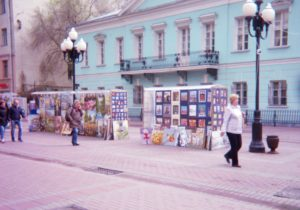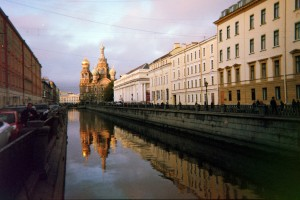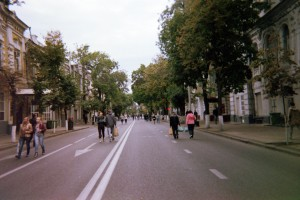Acceptable Bigotry and Scapegoating of Russia
Exclusive: The scapegoating of Russia has taken on an air of bigotry and ugliness, based largely on Cold War-era stereotypes. In this article, Natylie Baldwin counters this intolerance with some of her positive impressions having traveled the country extensively.
By Natylie Baldwin
Over the last year and a half, Americans have been bombarded with the Gish Gallop claims of Russiagate. In that time, the most reckless comments have been made against the Russians in service of using that country as a scapegoat for problems in the United States that were coming to a head, which were the real reasons for Donald Trump’s upset victory in 2016. It has even gotten to the point where irrational hatred against Russia is becoming normalized, with the usual organizations that like to warn of the pernicious consequences of bigotry silent.
 The first time I realized how low things would likely get was when Ruth Marcus, deputy editor of the Washington Post, sent out the following tweet in March of 2017, squealing with delight at the thought of a new Cold War with the world’s other nuclear superpower: “So excited to be watching The Americans, throwback to a simpler time when everyone considered Russia the enemy. Even the president.”
The first time I realized how low things would likely get was when Ruth Marcus, deputy editor of the Washington Post, sent out the following tweet in March of 2017, squealing with delight at the thought of a new Cold War with the world’s other nuclear superpower: “So excited to be watching The Americans, throwback to a simpler time when everyone considered Russia the enemy. Even the president.”
Not only did Marcus’s comment imply that it was great for the U.S. to have an enemy, but it specifically implied that there was something particularly great about that enemy being Russia.
Since then, the public discourse has only gotten nastier. Former Director of National Intelligence James Clapper – who notoriously perjured himself before Congress about warrantless spying on Americans – stated on Meet the Press last May that Russians were uniquely and “genetically” predisposed toward manipulative political activities. If Clapper or anyone else in the public eye had made such a statement about Muslims, Arabs, Iranians, Jews, Israelis, Chinese or just about any other group, there would have been some push-back about the prejudice that it reflected and how it didn’t correspond with enlightened liberal values. But Clapper’s comment passed with hardly a peep of protest.
More recently, John Sipher, a retired CIA station chief who reportedly spent years in Russia – although at what point in time is unclear – was interviewed in Jane Mayer’s recent New Yorker piece trying to spin the Steele Dossier as somehow legitimate. On March 6, Sipher took to Twitter with the following comment: “How can one not be a Russophobe? Russia soft power is political warfare. Hard power is invading neighbors, hiding the death of civilians with chemical weapons and threatening with doomsday nuclear weapons. And they kill the opposition at home. Name something positive.”
In fairness to Sipher, he did backpedal somewhat after being challenged; however, the fact that his unfiltered blabbering reveals such a deep antipathy toward Russians (“How can one not be a Russophobe?”) and an initial assumption that he could get away with saying it publicly is troubling.
Glenn Greenwald re-tweeted with a comment asking if Russians would soon acceptably be referred to as “rats and roaches.” Another person replied with: “Because they are rats and roaches. What’s the problem?”
This is just a small sampling of the anti-Russian comments and attitudes that pass, largely unremarked upon, in our media landscape.
There are, of course, the larger institutional influencers of culture doing their part to push anti-Russian bigotry in this already contentious atmosphere. Red Sparrow, both the book and the movie, detail the escapades of a female Russian spy. The story propagates the continued fetishization of Russian women based on the stereotype that they’re all hot and frisky. Furthermore, all those who work in Russian intelligence are evil and backwards rather than possibly being motivated by some kind of patriotism, while all the American intel agents are paragons of virtue and seem like they just stepped out of an ad for Nick at Nite’s How to be Swell.
The recent Academy Awards continued their politically motivated trend of awarding Oscars for best documentary to films on topics that just happen to coalesce nicely with Washington’s latest adversarial policy. Last year it was the White Helmets film to support the regime change meme in Syria. This year it’s Icarus about the doping scandal in Russia.
Similarly, Loveless, the new film by Russian director Andrey Zvyagintsev (director of Leviathan) is being reviewed – as Catherine Brown points out – by writers from the mainstream American media in a predictably biased fashion. The film focuses on the disintegration of a married Moscow couple’s relationship and the complicated web of factors involved which have tragic ramifications for the couple’s 12-year old son.
American reviewers manage to paint the factors detailed in the film that are prevalent in most modern capitalist cities (e.g. being self-centered, materialistic and preoccupied with technological gadgets) as somehow uniquely Russian sins. They also ignore a prominent character in the film that defies their negativity about modern Russia – a character that represents altruism and the growth of civil society in the country.
A common theme in all this is that Russia is a bad country and Russians can’t help but be a bunch of good-for-nothings at best and dangerous deviants at worst. Indeed, according to media depictions, sometimes they manage to be both at the same time. But what they don’t manage to be is positive, constructive or even complicated. Sipher knows that the average American has been deluged with this anti-Russian prejudice, as reflected in his challenge at the end of his initial tweet about the largest country, geographically at least, in the world: Name something positive.
Countering the Negative
Most people know, at least in the abstract, that few individuals or groups are purely good or bad. Most are a complex combination of both. But many – including those who normally consider themselves to be open-minded liberals – have allowed their lizard brains to be triggered by the constant demonization of Russia in the hopes of taking down Trump whom they deem to be a disproportionate threat to everything they hold dear. So as a counterweight to all the negative constantly pumped out about Russia and to take Sipher up on his challenge, I will list some positive things about Russia and the contribution of the country and its people to the world.
Contemporary Russia’s Domestic Policy
Russia has one of the most educated populations in the world, universal health care for its people, a home ownership rate of 84%, strong gun control laws, no death penalty, 140 days of guaranteed maternity leave for women at 100% salary, and Moscow was just voted the 4th safest megacity in the world for women.
And, despite claims that are often repeated in corporate media and even by many in the alternative press, Russia has independent and critical voices in the print media. Even on television, which is heavily influenced by the Kremlin, the Western position is often given airtime by either pro-Western Russian critics or Westerners themselves. During both of my visits to Russia (in 2015 and 2017) I interviewed a cross-section of Russians who all confirmed that they had access to Western media through both satellite and the internet. Furthermore, while violence against journalists is a concern, according to the Committee to Protect Journalists, journalist murders have decreased significantly under Putin compared to the era of Boris Yeltsin in the 1990s.
Am I saying that Russia is a utopia without any problems? No. Like most countries, it has plenty. Most Russians, including Putin, admit this. These problems include still significant poverty rates, comparatively low productivity and life expectancy, and corruption. But it is important to note the direction of trends, which are mostly positive since Putin took over. Under his leadership, poverty rates have been cut in half, life expectancy has increased by several years – especially among men who had suffered the worst mortality crisis since WWII, crime has dropped, pensions have increased and are paid regularly, the unemployment rate has been around 5% for years, great investments in infrastructure and agriculture have been seen along with development throughout the country.
And that development has not just been seen in Moscow and St. Petersburg – the latter city which, by the way, culturally and architecturally rivals those in France and Italy.
There are plenty of medium-sized cities throughout Russia that are becoming well-developed and culturally engaging. As one example, during my 2015 trip, I visited Krasnodar, located in the Black Sea region. The rate of civic construction in the city during 2014 surpassed even Moscow. As a consequence of the challenges of this rapid development, the public felt that decisions were not being made with sufficient feedback from residents, several of whom got together and created a group called the Public Council which eventually found ways to get city authorities to listen to their concerns.
The group had received significant media attention, networked with youth groups and infrastructure specialists, and received foreign experts in urban planning, public arts, transportation and city marketing. They have also organized periodic clean-up and renovation days, which are sponsored by local businesses that donate use of equipment. Currently, they are working on the creation of protected green zones, including one that connects all of the city’s hiking paths and another to connect its 16 lakes. They have received no opposition from the Russian government and have elicited the interest of other cities who want to model their approach to local issues.
While in Krasnodar I met a dozen or more professionals, from lawyers to engineers and doctors, who lived in the city and were part of another civic group engaged in charitable, conservation and youth programs. At one point, I took a walking tour of the city. In terms of architecture, I saw the old and the new side by side, including a large shopping center that was built around a large tower that had been there for generations that local residents saved from destruction by the mall planners, a square with controversial fountains, and a main thoroughfare that was closed to auto traffic, allowing pedestrians free reign. Couples – including some of mixed race, parents pushing baby strollers, and bicyclists – all wound their way through the streets as both Russian and American music was piped in and building walls on one side of the street for a stretch displayed delicate illustrations of Russian history.
Fifteen hundred miles away in the Ural mountain region, the city of Yekaterinburg – named after Catherine I – has the infamous distinction of being the place where Czar Nicholas II and his family were massacred by the Bolsheviks in 1918. On the site where the family’s bodies were exhumed, a magnificent Russian Orthodox Church has been erected and dedicated to the last royal family. Nearby is the Yeltsin Library, denoting the Russian Federation’s first President, although his legacy is not popular in Russia today.
The city is also home to a wide variety of precious metals and gems, along with a thriving economy. According to Sharon Tennison, an independent program coordinator who has traveled there numerous times over the past 15 years, hundreds of new apartment blocks can be seen on the outskirts of the city to accommodate the recent economic and population growth.
Yekaterinburg has a bustling cultural life that includes an opera house, a ballet, numerous theaters and museums, as well as dozens of libraries. In this respect, the city has continued its preoccupation with the classical arts as in Catherine’s period. At the same time, many modern Russian rock bands with a distinctive sound have formed there (known as Ural rock).
The city also has a low rate of violence and crime.
As the New York Times and NPR like to point out and generalize out from, there are some rural and industrial areas in Russia that still need attention and investment. However, there are other towns in the countryside that are doing well.
Russia’s Contributions to the World
Russia has made many cultural and humanitarian contributions to the world. In the 18th and 19th centuries, imperial Russia produced some of the most renowned figures in the world of arts. These include writers, such as Tolstoy and Dostoevsky, whose works are often cited by American readers as among the greatest of all time; great composers include Tchaikovsky, Stravinsky and Rachmaninoff.
The country also has a rich history of pre-Soviet philosophers who debated questions of politics, history, spirituality and meaning. One of the most famous is Vladimir Solovyev, classified as belonging to the Slavophile school but distinguished from his fellow Slavophiles by his openness to and integration of several lines of thought.
He acknowledged the intuitive as well as the rational. He was friends with Dostoyevsky but had disagreements over Orthodoxy since Solovyev was an advocate of ecumenism and healing the schism between Orthodoxy and Catholicism. Furthermore, he is credited with influencing Nicolai Berdyaev, Rudolf Steiner and the Russian Symbolists, among others. He admired the Greek goddess Sophia who he characterized as the “merciful unifying feminine wisdom of God.” Solovyev was adept at integrating several spiritual strands, such as Greek philosophy, Buddhism, Kabbalah, and Christian Gnosticism.
Solovyev was famous for his debates with Slavophile contemporary, Nicolai Fedorov. In these and other writings, questions about morality and technological progress, how much humans should control nature, and prioritizing which problems to invest man’s resources in solving were all given great consideration by Solovyev and are still relevant today, in both Russian society and the larger world.
It is interesting to note that, of all the early Slavophile philosophers, Putin chose Solovyev, the one who was the least strident and most open to the synthesis of differing values and viewpoints, as part of his assignment of books for Russia’s regional governors to read a few years back. Of course, that didn’t stop several western pundits – who showed they knew virtually nothing of Solovyev but perhaps some cherry-picked and out-of-context tidbits they’d found online – from distorting his writings, which naturally had to be horrible because Putin recommended them.
Moving on to the 20th century, it should not be forgotten that the Soviet Union bore the brunt of defeating the Nazis during WWII, losing 27 million people, and saw a third of their country destroyed in the process.
In the 21st century, Russia provided significant aid to Americans in the aftermath of Hurricane Katrina and Hurricane Sandy. They also provided safe transport to Yemeni-Americans out of that devastated country after the U.S. State Department effectively abandoned them in 2015. Russia provided medical aid to 60,000 people affected by the Ebola epidemic in West Africa in 2014. Last September, Russia provided 35 tons of aid to earthquake victims in Mexico.
For someone who spent years in Russia as a professional expert working for the U.S. intelligence community, John Sipher is either not well-informed on his subject or is intentionally being disingenuous when it comes to the suggestion that Russia has done nothing positive, whether under Putin’s governance or before.
The Purpose of Scapegoating Russia
In early 2017, journalists Jonathan Allen and Amie Parnes published a book called Shattered: Inside Hillary Clinton’s Doomed Campaign. Largely based on interviews with insiders from Hillary Clinton’s failed 2016 presidential campaign, the book was an attempt to analyze why she lost. The insiders agreed that Clinton had trouble providing a plausible explanation to voters as to why she was running other than that she simply wanted to be president. They also noted her trouble connecting with average Americans and her failure to campaign in certain rust belt areas that Trump ultimately got support in. The book also states that within 24 hours of Clinton’s loss, members of her campaign had decided to home in on the excuse of “Russian interference” to explain away her humiliating defeat.
In addition to a bloc of Clinton’s supporters continuing to push this excuse for her loss and the ratings motive that channels like CNN and MSNBC have in continuing to milk the scandal, there is also Robert Mueller’s investigation which has dragged on for over a year.
The most notable thing about the Mueller investigation to anyone who takes a sober look at it is its constantly evolving purpose. First, the purpose of the investigation was to find any evidence to support the allegation that Russia had hacked into the DNC’s emails. When no substantial evidence could be found to support that allegation, the purpose evolved into collusion between Trump and Russia to steal the election on behalf of Trump.
When no substantial evidence could be found to support that allegation, the purpose evolved yet again into Russia influencing the election on behalf of Trump, possibly without his knowledge or participation. When no substantial evidence could be found to support that allegation and all that could be found was a paltry number of social media ad buys – many of which were purchased after the election or advocated conflicting positions or didn’t even have anything to do with the election, the purpose became “sowing discord.”
After all of this, we have an indictment against 13 private individuals who worked for a “troll farm” that had been exposed several years ago and is run by a caterer with no proven orchestration by Putin or the Kremlin. Mueller also knows that this indictment will never be legally tested because the 13 individuals will never be extradited and stand trial.
After all the shrieking and howling 24/7 for close to a year and a half that Trump was an illegitimate president installed by the Kremlin, this is the best Mueller and the mainstream Democrats can come up with. It’s pretty obvious by now that this investigation has simply been feeding into the media and Democratic Party circus mentioned above rather than uncovering anything substantive with which to impeach Trump.
The 2016 election showed that the Democrats faced a sleeping giant that had been awakened – one that the Democratic Party had helped to create for decades by enabling lower living standards, outsourcing of good-paying jobs, the proliferation of low-wage jobs, unaffordable education, lack of health care coverage, public health problems, and decrepit infrastructure.
Consequently, there was a demand for meaningful policies that would help average Americans, policies that polls show they want. But mainstream Democrats will not deliver on such policies, like $15/hour minimum wage, Medicare for All, and pulling out of our wars and investing the money saved in jobs and infrastructure. They won’t deliver on these things for the same reason that Republicans won’t deliver on them: because their donors don’t want them to. But they are not going to admit that to the American people who were going to keep demanding, so they needed a scapegoat and a diversion.
It’s a cheap trick that the political elite is using to appeal to the basest instincts of their fellow Americans while shoring up support for their most reckless tendencies in the area of foreign policy.
Natylie Baldwin is co-author of Ukraine: Zbig’s Grand Chessboard & How the West Was Checkmated, available from Tayen Lane Publishing. Since October of 2015, she has traveled to six cities in the Russian Federation and has written several articles based on her conversations and interviews with a cross-section of Russians. Her fiction and nonfiction have appeared in various publications including Consortium News, The New York Journal of Books, The Common Line, and the Lakeshore. She is currently submitting her first novel to agents and finishing a second. She blogs at natyliesbaldwin.com. source:https://consortiumnews.com/2018/03/15/acceptable-bigotry-and-scapegoating-of-russia/




